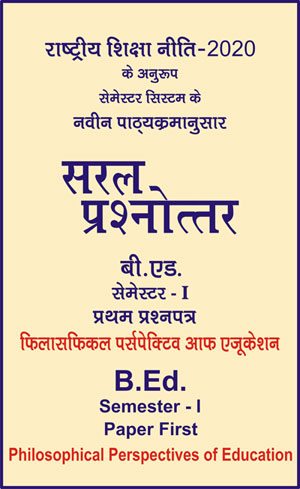|
बी एड - एम एड >> बी.एड. सेमेस्टर-1 प्रश्नपत्र-I - फिलासफिकल पर्सपेक्टिव आफ एजुकेशन बी.एड. सेमेस्टर-1 प्रश्नपत्र-I - फिलासफिकल पर्सपेक्टिव आफ एजुकेशनसरल प्रश्नोत्तर समूह
|
|
|||||||
बी.एड. सेमेस्टर-1 प्रश्नपत्र-I - फिलासफिकल पर्सपेक्टिव आफ एजुकेशन (अंग्रेजी भाषा में)
Question- Define Pragmatism. Compare and contrast between the aims and methods of Pragmatism and Naturalism.
Or"Pragmatism and Idealism, as far as concept of education is concerned, are nearer than the concept of Naturalism." Submit your assumptions.
Or
Explain the meaning of Pragmatism. Describe the main characteristics of Pragmatic Philosophy.
Related Short Answer - Questions
What is Pragmatism?
Answer -
Pragmatism
One of the most important schools of philosophy of education is Pragmatism. It is also as old as idealism, naturalism, and realism since it is more an attitude, than a philosophy. In the fifth century B.C., Heraclitus said, "One cannot step twice into the same river." Thus, Reality is a flux, things are ever-changing. Modern Pragmatists agree with the Greek sophists. According to Protagores, "Man is the measure of all things." This maxim is the basis of modern humanism. Another famous sophist Gorgias used to say, "Nothing exists and if anything exists we can never know it." This agnosticism has led to relativism in pragmatic epistemology. In modern times, Francis Bacon and Auguste Comte were
pragmatists. John Dewey regards Bacon, as the prophet of a pragmatic conception of knowledge. August Comte ceated positive philosophy which formed the basis of pragmatic social philosophy. Pragmatists agree with Comte that the universe is composed of laws and relations and not substance. John Locke said, "Our business is not to know all things but those which concern our conduct." Immanual Kant used the word pragmatic in a different sense.
Meaning of Pragmatism: According to Robert, R. Rusk, the Oxford Dictionary first referred to the term ‘pragmatic’ in 1643 and the term ‘Pragmatism’ in 1663. According to The Concise Oxford Dictionary, the term ‘pragmatic’ means dealing with matters according to their practical significance or immediate importance. The term ‘pragmatism’, according to the same source, means: "Doctrine that evaluates any assertion solely by its practical consequences and its bearing on human interests." The term pragmatism has been derived from the Greek term ‘pragma’, which means use. Thus, pragmatism is an ism according to which use is the criteria of reality.
In 1870, in Boston and Cambridge, a study circle informally but frequently met for discussion. It was called the Metaphysical Club. As Charles Pierce points out, "It was there that the name and doctrine of pragmatism saw the light." Thus, historically speaking, the doctrine of pragmatism in contemporary times was first referred by Charles Sanders Pierce in his famous essay of 1878 in the Popular Science Monthly on "How to Make Our Ideas Clear." Pierce gave it its first clear-cut formulation and later decided to use the label "Pragmatism as one ugly enough to protect his views from unwanted associations going with pragmatism." In point of fact, pragmatism is a name that has referred to many varieties of doctrines since Pierce took over from Kant the adjective ‘pragmatic’ to stress the relation to thought and knowledge to definite human purpose.
|
|||||

 i
i 










